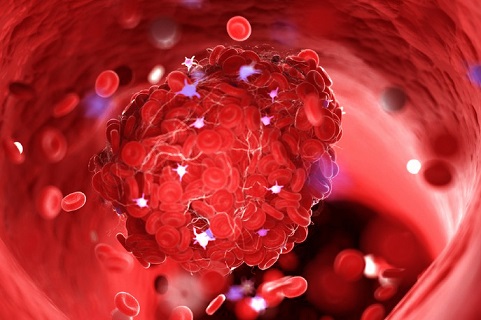Nikhil Prasad Fact checked by:Thailand Medical News Team Oct 20, 2024 1 year, 1 month, 4 weeks, 15 hours, 25 minutes ago
Medical News: Since the emergence of the COVID-19 pandemic in late 2019, caused by the SARS-CoV-2 virus, researchers have been racing to understand why some patients develop severe complications. One such complication is thrombosis - a condition where blood clots form in veins and arteries, posing serious health risks. Recent studies are shedding light on how the immune system may inadvertently contribute to this problem, leading to what scientists are calling "immunothrombosis."
 Russian study provides insights of Immunothrombosis in COVID-19
Thrombosis in Severe COVID-19
Russian study provides insights of Immunothrombosis in COVID-19
Thrombosis in Severe COVID-19
COVID-19 is typically a mild disease, with most people experiencing symptoms such as fever, cough, and fatigue. However, a small percentage of patients develop life-threatening complications, including severe respiratory distress and damage to organs like the lungs, heart, and kidneys. What makes these severe cases particularly dangerous is the onset of thrombotic events, such as blood clots forming in vital organs.
In severe cases of COVID-19, thrombotic complications are common, yet the exact mechanisms behind this remain poorly understood. It is now becoming evident that the body’s own immune system, while trying to fight off the virus, can trigger these blood clots. This phenomenon has been termed immunothrombosis. Recent research indicates that disruptions in the innate immune system's normal functions are a significant contributor to this issue.
The Role of Immune Systems in Thrombosis
The body's initial defense against SARS-CoV-2 includes the pattern recognition receptors (PRRs) and the complement system, both of which are essential components of innate immunity. These systems identify and neutralize pathogens like viruses. Ideally, they should quickly eliminate the virus and restore normal health. However, in severe COVID-19 cases, these systems can overreact, leading to widespread inflammation.
This
Medical News report focuses on how this overactive immune response may, in fact, be a double-edged sword. Instead of simply clearing the virus, the excessive inflammation damages blood vessels and triggers a hypercoagulable state, where blood is more prone to clot. The complement system, a crucial player in innate immunity, is also activated excessively during severe COVID-19 cases, exacerbating inflammation and coagulation.
Immune Responses and Hypercoagulability
Hypercoagulability in COVID-19 has been linked to an overactive immune response. In particular, an excessive inflammatory reaction can cause significant damage to the endothelium, the thin layer of cells lining blood vessels. When these cells are damaged, they can trigger a cascade of events leading to blood clot formation. Research has shown that the complement system interacts with various immune cells and proteins in ways that lead to blood clotting, contributing to the severity of the disease.
Another key player in this process is the Toll-like receptor (TLR) family, which includes proteins that recogniz
e molecular patterns associated with pathogens like SARS-CoV-2. Once activated, TLRs can initiate a chain of molecular events that promote inflammation. When combined with the actions of the complement system, TLRs may inadvertently promote thrombosis. This synergistic effect between TLRs and complement activation seems to play a significant role in the development of severe COVID-19 symptoms, including blood clots.
Key Study Findings:
Research conducted by scientists from the Koltzov Institute of Developmental Biology RAS in Moscow, Russia, has highlighted how the complement system and innate immune responses are intricately involved in the thrombotic complications seen in severe COVID-19. Their study provides detailed insights into how immune overactivation contributes to a hypercoagulable state in these patients. Key findings include:
-Complement Activation:
The researchers discovered that SARS-CoV-2 directly triggers the complement system, leading to the production of molecules like C3a and C5a, which promote inflammation and enhance blood clotting. This activation is often unchecked in severe COVID-19 cases, worsening patient outcomes.
-Endothelial Damage:
Endothelial cells, which line blood vessels, are damaged in severe COVID-19 due to the inflammatory response. The complement system's overactivity leads to the formation of membrane attack complexes (MACs), which puncture these cells, exacerbating blood vessel damage.
-Synergy with TLRs:
The study also highlights how TLRs, particularly TLR2 and TLR4, work in tandem with the complement system to amplify the immune response. While this synergy is essential in fighting off the virus, in severe cases, it spirals out of control, triggering dangerous levels of clotting.
-Hypercoagulation and Organ Damage:
When blood clots form in critical organs such as the lungs, heart, and brain, they can block oxygen delivery, leading to multiple-organ failure. The hyperinflammation seen in severe COVID-19 cases not only leads to clot formation but also reduces the body's ability to dissolve these clots, increasing the risk of long-term complications.
Conclusion:
This growing body of evidence shows how the immune system, particularly the complement system and TLRs, may inadvertently contribute to the formation of blood clots in severe COVID-19 cases. While these immune mechanisms are essential in the fight against the virus, their overactivation can lead to life-threatening thrombotic complications. Understanding these processes is critical for developing new treatments aimed at modulating the immune response, reducing the risk of blood clots, and improving outcomes for patients with severe COVID-19.
The study's findings highlight the need for therapies that can regulate both the immune and coagulation systems. Targeted treatments that suppress specific components of the complement system or TLRs could be game-changers in preventing thrombotic complications without compromising the body's ability to fight the virus. With continued research, it is hoped that such treatments will become available, offering new hope to patients affected by this devastating disease.
The study findings were published in the peer-reviewed International Journal of Molecular Sciences.
https://www.mdpi.com/1422-0067/25/20/11267
For the latest COVID-19 News, keep on logging into Thailand
Medical News.
Read Also:
https://www.thailandmedical.news/news/thymidine-phosphorylase-identified-as-key-driver-of-spike-protein-induced-blood-clots-in-covid-19
https://www.thailandmedical.news/news/german-scientists-uncover-how-sars-cov-2-s-spike-protein-influences-blood-clotting-and-immune-response
